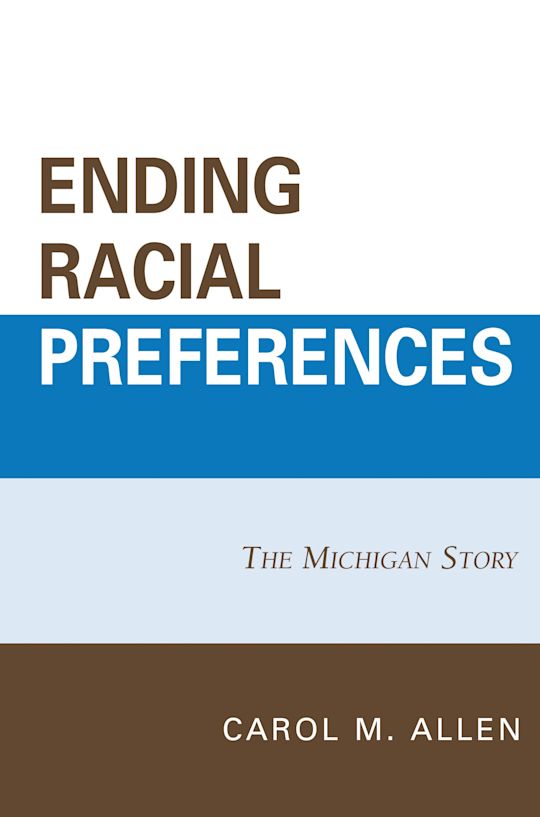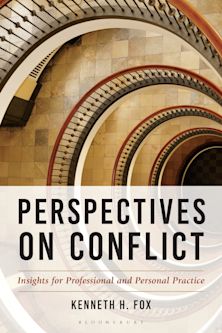- Home
- ACADEMIC
- Politics & International Relations
- Politics - Other
- Ending Racial Preferences
Ending Racial Preferences
The Michigan Story
Ending Racial Preferences
The Michigan Story
You must sign in to add this item to your wishlist. Please sign in or create an account
Description
In 2006, Michigan voters banned affirmative action preferences in public contracting, education, and employment. The Michigan Civil Rights Initiative (MCRI) vote was preceded by years of campaigning, legal maneuvers, media coverage, and public debate. Ending Racial Preferences: The Michigan Story relates what happened from the vantage point of Toward A Fair Michigan (TAFM), a nonprofit organization that provided a civic forum for the discussion of preferences. The book offers a timely "inside look" into how TAFM fostered dialogue by emphasizing education over indoctrination, reason over rhetoric, and civil debate over protest.
Ending Racial Preferences opens with a review of the campaigns for and against similar initiatives in California, Florida, Washington, and the city of Houston. The book then delivers an in-depth historical account of the MCRI–from its inception in 2003 through the first year following its passage in 2006. Readers are invited to decide for themselves whether affirmative action preferences are good for America. Carol M. Allen reproduces the remarks delivered at a TAFM debate, along with a compilation of pro and con responses by 14 experts to 50 questions about preferences. This book will be of interest to those working in the fields of public policy and state politics.
Table of Contents
Chapter 2 Foreword
Chapter 3 Preface
Chapter 4 Acknowledgments
Chapter 5 1 What Came Before
Chapter 6 2 Creating a Fair Michigan, Part I: The Ballot Petition Process
Chapter 7 3 Creating a Fair Michigan, Part II: The Election Campaigns
Chapter 8 4 The Debates: A Simple Dialogue
Chapter 9 5 "Ask the Experts": Questions from the Debates
Chapter 10 6 What Followed?
Chapter 11 7 Moving from Diversity to Inclusion: The Way Forward
Chapter 12 Appendix I: Debates Sponsored by Toward A Fair Michigan
Chapter 13 Appendix II: Audience Feedback from the TAFM Debates
Chapter 14 Appendix III: Brief of Amicus Curiae
Chapter 15 Bibliography
Chapter 16 About the Author and Contributor
Product details
| Published | Feb 05 2009 |
|---|---|
| Format | Ebook (PDF) |
| Edition | 1st |
| Extent | 440 |
| ISBN | 9798216335429 |
| Imprint | Lexington Books |
| Series | Bloomsbury Studies in Political Communication |
| Publisher | Bloomsbury Publishing |
About the contributors
Reviews
-
Ending Racial Preferences: The Michigan Story tells how determined citizens mobilized to end racial preferences despite the opposition of every civic and political institution in the state. The success of the Michigan Civil Rights Initiative vindicates Allen's belief in the ability of democratic institutions to withstand the pressures of modern interest group politics.
Terence J. Pell, President, Center for Individual Rights
-
This book tells one of the great 'David vs. Goliath' stories in modern Michigan politics. The odds that Towards a Fair Michigan had to overcome were truly overwhelming; no matter where you stand on Affirmative Action, you will get a real education from reading how this small, tightly-organized group managed to win.
Bill Ballenger, editor,Inside Michigan Politics
-
Two virtues give this book extraordinary value. It provides a wealth of accurate and little-known detail about the origin and passage of the Michigan Civil Rights Initiative-an authoritative account that will never be matched. It also provides an inspiring model for the working of democracy. Ordinary citizens may collectively, as Aristotle wrote and Carol Allen shows, achieve surpassing wisdom “when they meet together.”
Carl Cohen, professor of philosophy, University of Michigan
-
Carol Allen has written a scholarly yet absorbing account of the scorching battle to end Michigan's use of race-based preferences in university admissions, hiring and contracting, including her own efforts to inject a degree of civility and rationality into the campaign. But she sees clearly that the success of the ballot measure in Michigan is only a beginning: she argues persuasively for substituting a vision of "inclusiveness" for policies based on increasingly narrow-minded notions of multiculturalism and diversity.
Tom Bray, former editorial page editor and columnist of The Detroit News



































